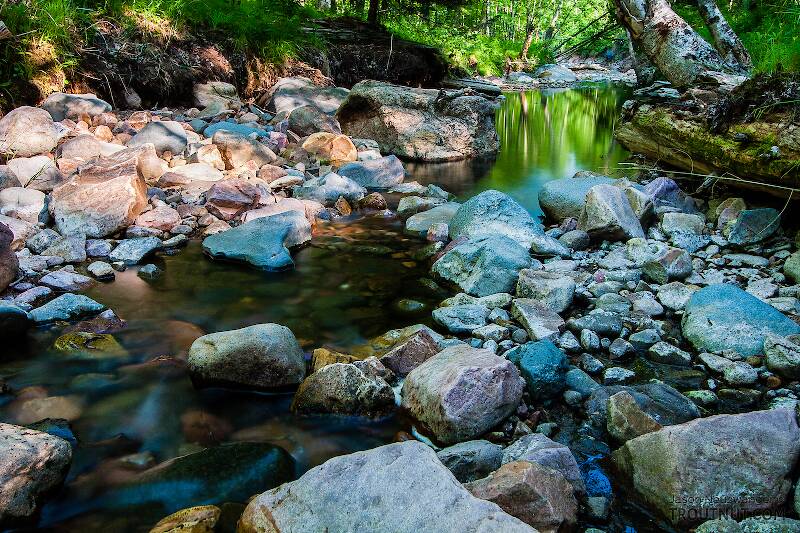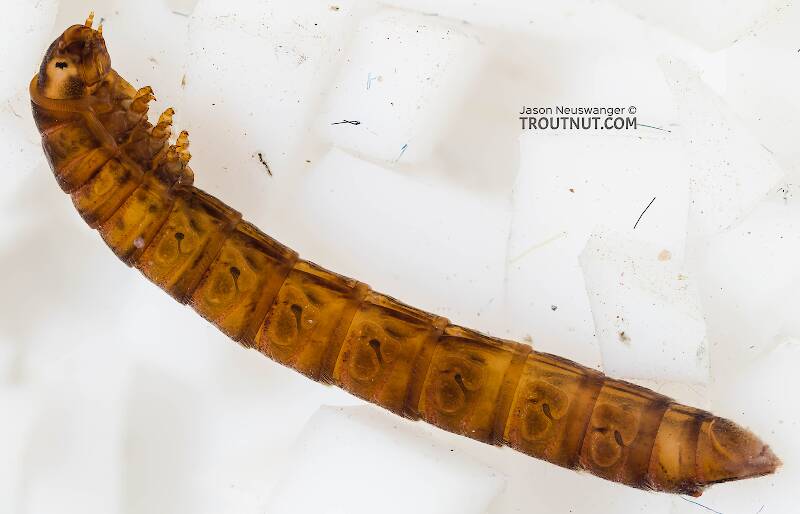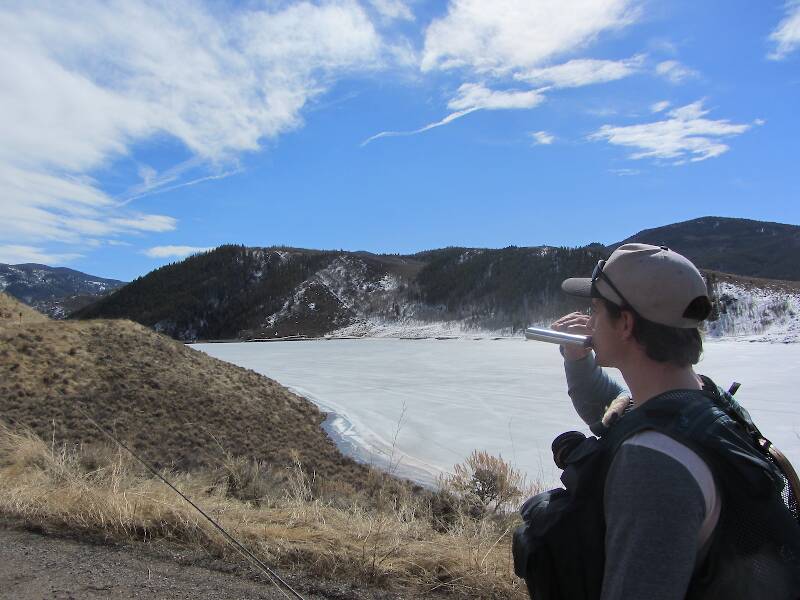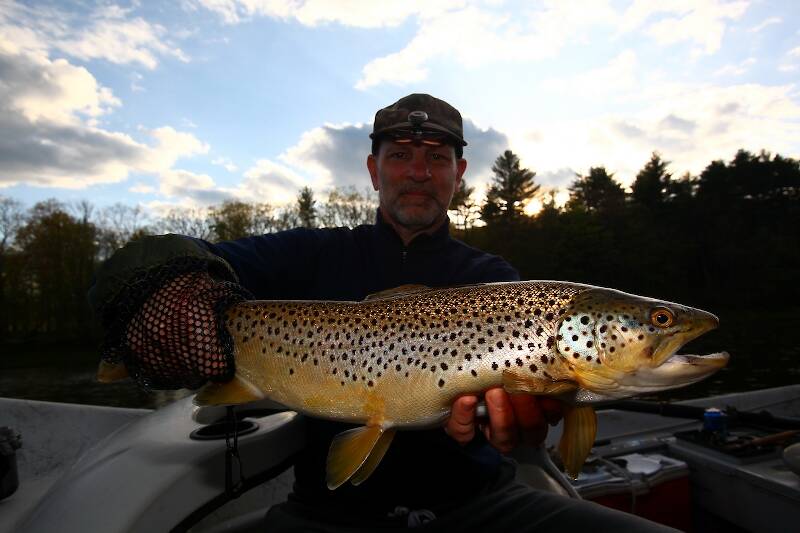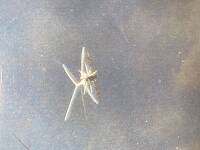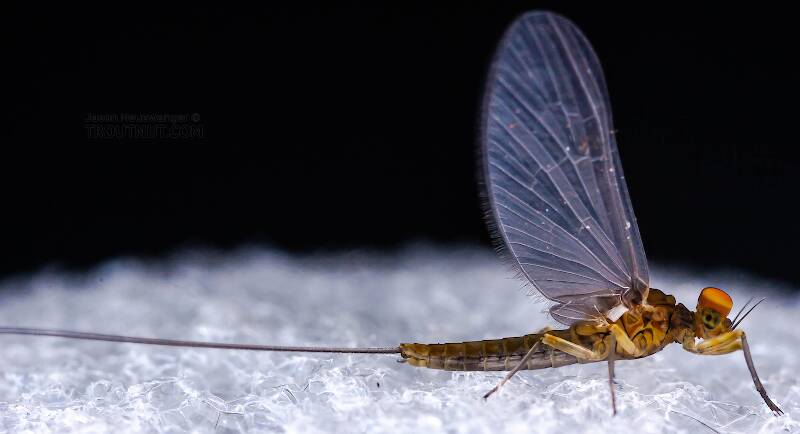
Blue-winged Olives
Baetis
Tiny Baetis mayflies are perhaps the most commonly encountered and imitated by anglers on all American trout streams due to their great abundance, widespread distribution, and trout-friendly emergence habits.
Featured on the forum

Troutnut is a project started in 2003 by salmonid ecologist Jason "Troutnut" Neuswanger to help anglers and
fly tyers unabashedly embrace the entomological side of the sport. Learn more about Troutnut or
support the project for an enhanced experience here.
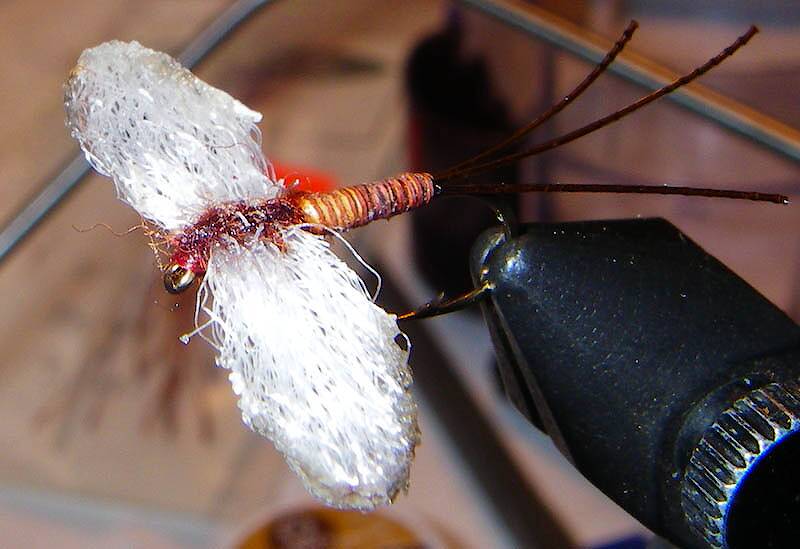
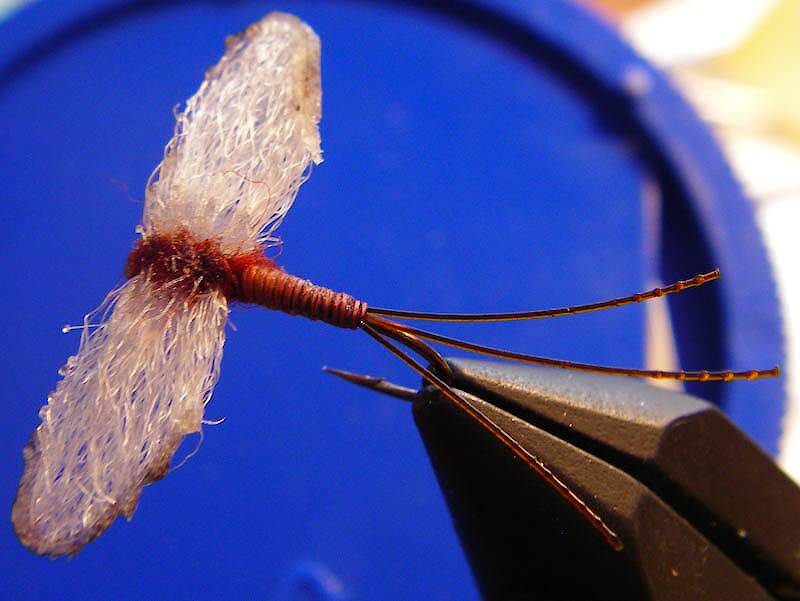
Troutnut on Apr 13, 2007April 13th, 2007, 7:03 am EDT
I've been playing around with a lot of the tying techniques in Gonzo's book and mixing & matching them with some of my old favorites and new ideas. Here's one I wanted to share, a mix of Gonzo's burnt poly wing (and dyed mono tails) with the "Ellis Triple Wing" spinner from Kelly Galloup's book Cripples and Spinners. It's a spent Hendrickson spinner with a perfect and well-defined wing silhouette.
There are a couple potential problems:
If this one casts well and stands up to a few sets of trout teeth, I'll post detailed instructions.
(I would have put this in the 'fly tying' section of the forum, but it doesn't allow me to add pictures. It would take a little while to re-program it.)
There are a couple potential problems:
- It might cause too much tippet spin. Hopefully it's flexible and thin enough that it won't, but I'll have to try it and see.
- Each fiber is connected to both wing edges, so tugging on one will pull the whole other wing out of shape. Gonzo suggested I zap-a-gap the base of each wing, which I did. Hopefully that works, but again I'll have to try it.
If this one casts well and stands up to a few sets of trout teeth, I'll post detailed instructions.
(I would have put this in the 'fly tying' section of the forum, but it doesn't allow me to add pictures. It would take a little while to re-program it.)
Jason Neuswanger, Ph.D.
Troutnut and salmonid ecologist
Troutnut and salmonid ecologist
GONZO on Apr 13, 2007April 13th, 2007, 7:39 am EDT
Cool-looking fly, Jason. I'll eagerly await the test results. Bring on the Hendricksons!
JAD on Apr 14, 2007April 14th, 2007, 2:19 am EDT
It sure is a pretty little tie, nice job. Their is just no way to beat a quill body fly their so pretty that I sometimes hate to use them-( Well almost).
John
They fasten red (crimson red) wool around a hook, and fix onto the wool two feathers which grow under a cock’s wattles, and which in colour are like wax.
Radcliffe's Fishing from the Earliest Times,
West on May 24, 2007May 24th, 2007, 4:16 am EDT
Very cool. I like the dubbing job between the wing fibers. Also the tail fibers stand out nicely. It looks like it would create a very nice silhouette. Nice tye!
West
http://pleasantly-obsessed.blogspot.com/
http://pleasantly-obsessed.blogspot.com/
Shawnny3 on May 24, 2007May 24th, 2007, 10:24 am EDT
Well conceived and well tied. Nice.
-Shawn
-Shawn
Jewelry-Quality Artistic Salmon Flies, by Shawn Davis
www.davisflydesigns.com
www.davisflydesigns.com
Afletcher
Posts: 3
Posts: 3
Afletcher on May 28, 2007May 28th, 2007, 2:47 am EDT
Shawn:
Is there still a fish hatchery in Pleasant Gap, Pa.? It used to have a nice public aquarium, with both native and exotic fishes, that was well worth visiting. In 1952 I was a field biologist for the Pa. Fish Comm., working out of the hatchery. I was part of a team that studied Upper Woods Pond. As a result of that study, the pond was poisoned and stocked with Kokanee Salmon. If I were in that profession today, I would recommend Brook Trout for such a deep, cold-water pond with good breeding streams for trout. The hatchery supt. was a man named Jerry Zettle, who had a beautiful umarried daughter. I was recently married, alas.
Alan M. Fletcher
Ithaca, N. Y.
Is there still a fish hatchery in Pleasant Gap, Pa.? It used to have a nice public aquarium, with both native and exotic fishes, that was well worth visiting. In 1952 I was a field biologist for the Pa. Fish Comm., working out of the hatchery. I was part of a team that studied Upper Woods Pond. As a result of that study, the pond was poisoned and stocked with Kokanee Salmon. If I were in that profession today, I would recommend Brook Trout for such a deep, cold-water pond with good breeding streams for trout. The hatchery supt. was a man named Jerry Zettle, who had a beautiful umarried daughter. I was recently married, alas.
Alan M. Fletcher
Ithaca, N. Y.
Afletcher
Posts: 3
Posts: 3
Afletcher on May 29, 2007May 29th, 2007, 3:26 am EDT
Sorry, Shawn. I checked my Pa. map and found that I had confused Pleasant Gap (near Bellefonte) with Pleasant Mount, which is in the NE corner of the state. Too much time has gone by!
Alan Fletcher
Alan Fletcher
Shawnny3 on May 29, 2007May 29th, 2007, 2:14 pm EDT
Alan, I'm actually an Ithaca native, so we have something in common after all.
Pleasant Gap does have a hatchery, actually. I've never lived in a place with so many hatcheries - you have to love a place where the trout outnumber the people 100 to 1. Central PA is awesome.
-Shawn
Pleasant Gap does have a hatchery, actually. I've never lived in a place with so many hatcheries - you have to love a place where the trout outnumber the people 100 to 1. Central PA is awesome.
-Shawn
Jewelry-Quality Artistic Salmon Flies, by Shawn Davis
www.davisflydesigns.com
www.davisflydesigns.com
Troutnut on May 29, 2007May 29th, 2007, 2:52 pm EDT
An update to this thread is in order to report on the performance of the fly. It's good. It doesn't spin the tippet very badly. The wings hold their shape pretty well. The burnt part around the edge tends to break up a little bit after extensive usage, but even then the wing holds its overall shape and presents a much better wing profile than other spinner imitations I've seen.
A big, picky Penn's Creek brown wrapped me around under a log and broke off on one of these, so I guess it looks tasty enough. I haven't run one through really tough testing (lots of fish on one fly) but it held up well through light usage.
A big, picky Penn's Creek brown wrapped me around under a log and broke off on one of these, so I guess it looks tasty enough. I haven't run one through really tough testing (lots of fish on one fly) but it held up well through light usage.
Jason Neuswanger, Ph.D.
Troutnut and salmonid ecologist
Troutnut and salmonid ecologist
Martinlf on May 30, 2007May 30th, 2007, 1:13 am EDT
If the Penns Creek browns like them, I'd say they are a success. Glad you got that bad boy to rise; after the hook up one loses a certain bit of control when there are logs nearby.
"He spread them a yard and a half. 'And every one that got away is this big.'"
--Fred Chappell
--Fred Chappell
Troutnut on Jun 10, 2007June 10th, 2007, 8:13 am EDT
I've had some more time to field test this fly, and it does have some serious problems. It is an extremely realistic spinner and the fish seem to like it, but it doesn't hold up very well in their teeth. Lots of the hi-vis fibers break off near the base but are still stuck to the outer edge, so you end up with these stray fibers splaying all over the place attached only to the burnt edge. A few would be fine, but it seems like a pretty significant problem.
It's also difficult in smaller sizes to burn the wings (since you burn them after the fly's tied on the hook) without getting the tails or some other component too close to the flame. There are probably several solutions to this, but it is a pretty big nuisance.
In light of these problems, I think I'm going to retire this fly and just fish the normal triple wing spinner (like this, but with the wings cut into the right shape instead of burned). The look isn't quite as cool but it's extremely durable and still beats the heck out of normal "floppy hourglass" spinner wings.
It's also difficult in smaller sizes to burn the wings (since you burn them after the fly's tied on the hook) without getting the tails or some other component too close to the flame. There are probably several solutions to this, but it is a pretty big nuisance.
In light of these problems, I think I'm going to retire this fly and just fish the normal triple wing spinner (like this, but with the wings cut into the right shape instead of burned). The look isn't quite as cool but it's extremely durable and still beats the heck out of normal "floppy hourglass" spinner wings.
Jason Neuswanger, Ph.D.
Troutnut and salmonid ecologist
Troutnut and salmonid ecologist
Invicta on Jun 11, 2007June 11th, 2007, 5:12 am EDT
Jason,
Before you retire the spinner pattern idea completely could I make a couple of suggestions? Instead of your burnt wing material, use organza fibers and trim them to shape. Hold them in place with crazy glue on the edges, and also next to the hook. And, if you would add just a small amount of hackle before and after the wings most if not all the pattern's spin on casting will be eliminated. The hackle breaks up the airflow over the wing fibers, no air flow – no spin. That type of pattern has worked for me, at least up to size 14, for several years out here on the Left Coast.
John
Before you retire the spinner pattern idea completely could I make a couple of suggestions? Instead of your burnt wing material, use organza fibers and trim them to shape. Hold them in place with crazy glue on the edges, and also next to the hook. And, if you would add just a small amount of hackle before and after the wings most if not all the pattern's spin on casting will be eliminated. The hackle breaks up the airflow over the wing fibers, no air flow – no spin. That type of pattern has worked for me, at least up to size 14, for several years out here on the Left Coast.
John
GONZO on Jun 11, 2007June 11th, 2007, 6:41 am EDT
Jason,
I, too, gave up on burnt fiber spinner wings (that's why there are none in the book), although the technique I used involved burning both ends of the material before tying to the hook. It was a bit of a pain to get the distance between the burnt ends just right, and getting the burnt tips to be in the same plane was even more problematic.
On burnt poly-wing duns, I just trim off any fibers that break due to snagging on trout teeth, and that has worked fine. If the melted bead breaks through hard use, I touch a tiny drop of Zap-A-Gap (applied with the tip of a needle) to one side of the broken bead and close the break. That has kept many of these flies in service through many many fish and even many seasons. (I would also mention, however, that I consider rolling the tip of the burner against your finger immediately after melting the fibers to be a critical step. This produces a thin flexible bead that won't break nearly as easily as the lumpier and more brittle bead that results without the rolling step. Any excess "flashing" that is produced from the compression of the bead can be trimmed off by laying fine scissors flat against the wing and trimming the excess.)
Just to piggyback on John's fine suggestion about organza, I wanted to mention that organza fabric (rather than the separated fibers) makes a very good burnt wing material. The trick is to be able to burn both sides of the connected wings to shape in one operation. To do this, I fold a small strip of organza over a piece of aluminum foil and insert the folded "sandwich" into the burner with the fold down (forming the base of the wing). The wing material/foil is then rough trimmed to a shape slightly larger than the burner tip. When the flame is applied along the edge, the organza melts toward the burner, leaving the foil to keep the two wings separated. You now have a connected pair of perfectly shaped sparkling organza wings. (Nylon fabric, like the stuff "silk" flowers are made from, also works well with this technique for more opaque wings on dun patterns.)
I, too, gave up on burnt fiber spinner wings (that's why there are none in the book), although the technique I used involved burning both ends of the material before tying to the hook. It was a bit of a pain to get the distance between the burnt ends just right, and getting the burnt tips to be in the same plane was even more problematic.
On burnt poly-wing duns, I just trim off any fibers that break due to snagging on trout teeth, and that has worked fine. If the melted bead breaks through hard use, I touch a tiny drop of Zap-A-Gap (applied with the tip of a needle) to one side of the broken bead and close the break. That has kept many of these flies in service through many many fish and even many seasons. (I would also mention, however, that I consider rolling the tip of the burner against your finger immediately after melting the fibers to be a critical step. This produces a thin flexible bead that won't break nearly as easily as the lumpier and more brittle bead that results without the rolling step. Any excess "flashing" that is produced from the compression of the bead can be trimmed off by laying fine scissors flat against the wing and trimming the excess.)
Just to piggyback on John's fine suggestion about organza, I wanted to mention that organza fabric (rather than the separated fibers) makes a very good burnt wing material. The trick is to be able to burn both sides of the connected wings to shape in one operation. To do this, I fold a small strip of organza over a piece of aluminum foil and insert the folded "sandwich" into the burner with the fold down (forming the base of the wing). The wing material/foil is then rough trimmed to a shape slightly larger than the burner tip. When the flame is applied along the edge, the organza melts toward the burner, leaving the foil to keep the two wings separated. You now have a connected pair of perfectly shaped sparkling organza wings. (Nylon fabric, like the stuff "silk" flowers are made from, also works well with this technique for more opaque wings on dun patterns.)
IEatimago on Jun 15, 2007June 15th, 2007, 5:56 am EDT
thats amazing, i need to learn to tie flies desperately
GONZO on Jun 18, 2007June 18th, 2007, 5:26 am EDT
What's holding you back, Jasen? There are certainly lots of people here who can help you overcome your desperation.
Troutnut on Jun 18, 2007June 18th, 2007, 6:12 am EDT
I was pretty confused until I noticed that was an 'e' instead of an 'o'!
Jason Neuswanger, Ph.D.
Troutnut and salmonid ecologist
Troutnut and salmonid ecologist
GONZO on Jun 18, 2007June 18th, 2007, 7:20 am EDT
Yeah, I always check the home pages to see if someone gives their name. It just seems more personal to communicate by first names. After all the Johns on the site, I was relieved to see another Jaso/en. At least the different spelling will make sorting out the Jaso/ens easier than sorting out the Johns.
Njflytyer on Jun 19, 2007June 19th, 2007, 4:17 am EDT
Troutnut, You talked about burning up the small flies when burning the wings and I thought about a small battery activaded burner that Ralph Graves had at the fly tying show at the Rockland House the 8&9 of June.It might solve your problem. I'll look for his number and let you know. He has a shop in the motel behind the Rockland House in Rosco,NY. But he has no set time of operation. Talk to you soon, Tight Lines till then, Chris
Troutnut on Jun 19, 2007June 19th, 2007, 4:33 am EDT
I've got a little battery activated burner -- the kind with the ultra-heated wire at the press of a button. I use it for lots of things, but it's not quite right for this sort of burning.
Jason Neuswanger, Ph.D.
Troutnut and salmonid ecologist
Troutnut and salmonid ecologist
Njflytyer on Jun 19, 2007June 19th, 2007, 12:17 pm EDT
Troutnut, Sounds like what I was trying to discribe, sorry I wasn't able to help. Just keep tying and fishing and enjoy yourself. Just by chance have you ever camped at Katskill Campground? I camped there from 1992 - 2000 and you remind me of a guy named Dave. I guess that showes my age. Good Luck on the rest of the season. I'm going to try and get up to the Ausable the beging of July and maybe catch the end of the drakes. Tight Lines, Chris
Quick Reply
Related Discussions
Topic
Replies
Last Reply
Re: This is one of my favorite mayfly photo sets
In Male Ephemerella aurivillii Mayfly Spinner by Troutnut
In Male Ephemerella aurivillii Mayfly Spinner by Troutnut
10
Jul 17, 2011
by Oldredbarn
by Oldredbarn

